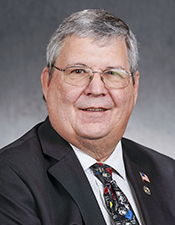Transportation committee considers $100 million for Corridors of Commerce
Waiting interminably at a traffic chokepoint gives drivers ample time to ponder if a new lane or improved interchange would get things moving. Often, the final answer is, “I’ll believe it when I see it.”
Corridors of Commerce is a way to address “they’ll never finish it in my lifetime” types of construction projects, said Shane Zahrt, representing the Coalition of Greater Minnesota Cities.
Rep. John Petersburg (R-Waseca) sponsors HF1910 to provide $100 million each year from the General Fund for the program that targets money to transportation projects that might otherwise not be funded.
It was laid over Tuesday by the House Transportation Finance and Policy Committee for possible omnibus bill inclusion.
As the basis for all aspects of the state’s economy, transportation is deserving of General Fund dollars, Petersburg argued.
“It’s time we start realizing how important transportation is. From the day you are born to the day you die, you are dependent on roads and bridges.”
Corridors of Commerce was established in 2013 to target dollars toward adding capacity, reducing bottlenecks, and improving interchanges to foster economic growth. Projects are evaluated on criteria such as return on investments, safety improvements, freight efficiency, impact on commerce, and connections to regional trade centers. Funding from Trunk Highway Bonds and the Trunk Highway Fund has totaled $1.18 billion since the program began.
Rep. Jeff Brand (DFL-St. Peter) said Corridors of Commerce projects save lives, referring in part to work done on dangerous stretches of Highway 14 in Southern Minnesota.
Citing projects such as an additional lane on Interstate 694 in Shoreview and the Interstates 494 and 35W interchange, the Municipal Legislative Commission supports funding Corridors of Commerce.
“Without additional funding being approved, the momentum of projects vital to our region will be curtailed, and necessary improvements to our states infrastructure will jeopardize the continued growth of communities and the economic prosperity they depend on,” wrote Edina Mayor James Hovland, the commission chair.
Related Articles
Search Session Daily
Advanced Search OptionsPriority Dailies
Speaker Emerita Melissa Hortman, husband killed in attack
By HPIS Staff House Speaker Emerita Melissa Hortman (DFL-Brooklyn Park) and her husband, Mark, were fatally shot in their home early Saturday morning.
Gov. Tim Walz announced the news dur...
House Speaker Emerita Melissa Hortman (DFL-Brooklyn Park) and her husband, Mark, were fatally shot in their home early Saturday morning.
Gov. Tim Walz announced the news dur...
Lawmakers deliver budget bills to governor's desk in one-day special session
By Mike Cook About that talk of needing all 21 hours left in a legislative day to complete a special session?
House members were more than up to the challenge Monday. Beginning at 10 a.m...
About that talk of needing all 21 hours left in a legislative day to complete a special session?
House members were more than up to the challenge Monday. Beginning at 10 a.m...
